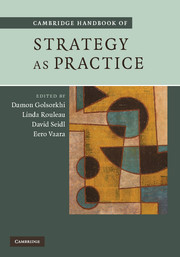Book contents
- Frontmatter
- Contents
- List of figures
- List of tables
- List of contributors
- Introduction: What is Strategy as Practice?
- PART I ONTOLOGICAL AND EPISTEMOLOGICAL QUESTIONS
- PART II THEORETICAL DIRECTIONS
- 7 Giddens, structuration theory and Strategy as Practice
- 8 An activity-theory approach to Strategy as Practice
- 9 A Bourdieusian perspective on strategizing
- 10 A Wittgensteinian perspective on strategizing
- 11 A Foucauldian perspective on strategic practice: strategy as the art of (un)folding
- 12 A narrative approach to Strategy as Practice: strategy making from texts and narratives
- PART III METHODOLOGICAL TRACKS
- PART IV APPLICATION VARIATIONS
- Author Index
- Index
- References
10 - A Wittgensteinian perspective on strategizing
Published online by Cambridge University Press: 05 October 2012
- Frontmatter
- Contents
- List of figures
- List of tables
- List of contributors
- Introduction: What is Strategy as Practice?
- PART I ONTOLOGICAL AND EPISTEMOLOGICAL QUESTIONS
- PART II THEORETICAL DIRECTIONS
- 7 Giddens, structuration theory and Strategy as Practice
- 8 An activity-theory approach to Strategy as Practice
- 9 A Bourdieusian perspective on strategizing
- 10 A Wittgensteinian perspective on strategizing
- 11 A Foucauldian perspective on strategic practice: strategy as the art of (un)folding
- 12 A narrative approach to Strategy as Practice: strategy making from texts and narratives
- PART III METHODOLOGICAL TRACKS
- PART IV APPLICATION VARIATIONS
- Author Index
- Index
- References
Summary
Introduction
In this chapter, I explore the potential contribution of Ludwig Wittgenstein to Strategy as Practice scholarship. Wittgenstein is probably the best-known philosopher of the twentieth century. His realization that the only satisfactory way to understanding language was to understand the social contexts in which it was used provided a basis for what was to become the practice turn in social sciences. His work informs a diverse set of social theorists from Giddens (1984) to Bourdieu (1977) and Lyotard (1986), all of whom build on Wittgenstein's elaborate inquiry into the ontology of language as a social phenomenon that is rooted in practice. Like these theorists, I shall focus on the concept language game, which is perhaps the core concept in what are known as the ‘late and middle periods’ in Wittgenstein's thought. I will argue that the language game is a useful concept in making sense of strategy practice in both a theoretical and a methodological sense.
While Wittgenstein's work has not been utilized to a great extent within the extant body of work on Strategy as Practice, at least two groups of scholars have used his concepts in their work within management and strategic management scholarship. The first group has found Wittgenstein's work on language games useful in studying the methodology, philosophy and ideology of the management sciences. A particular area of interest is the relationship between management scholars and practitioners (Astley and Zammuto 1992; Beyer 1992; Donaldson 1995).
Information
- Type
- Chapter
- Information
- Cambridge Handbook of Strategy as Practice , pp. 155 - 167Publisher: Cambridge University PressPrint publication year: 2010
References
Accessibility standard: Unknown
Why this information is here
This section outlines the accessibility features of this content - including support for screen readers, full keyboard navigation and high-contrast display options. This may not be relevant for you.Accessibility Information
- 8
- Cited by
